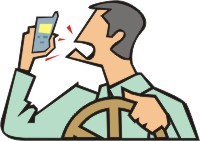|
Star Diary
The Mobile Phone and Road Safety

A few days ago, my father, after reaching home from the doctor's chamber asked me to accompany him to the Popular Diagnostic Centre. He had to take a few tests. We hired a CNG run auto-rickshaw. I noticed that the roads were practically empty. While we were going through one of the shortcut roads, the driver's mobile phone rang. After receiving the phone he soon became engrossed in a conversation with someone. All of a sudden, a pedestrian suddenly appeared in front of the auto. The driver realised it just in time and stepped on the brakes immediately! He would have killed the man otherwise. When my father requested him earnestly not to use the mobile phone while driving, I was astounded to see that he was least bothered. He was not the tiniest bit remorseful for his serious mistake but instead said that he had the right to use the mobile phone. There is of course no denying that technology has made our life easier and comfortable but there are some people who have turned the blessing into a curse by using it in the wrong way.
Md. Manirul Islam
Computer Engineering
American International University-Bangladesh (AIUB), Dhaka
Preface to the Passport Office
There is a common myth that in Bangladesh getting a passport is more difficult than getting a visa. I never believed this tale, until I experienced the ordeal myself. Students, in my opinion, should learn how to get a passport, instead of opening a bank account. A few days ago, I had gone to the Chittagong regional passport office. Though I submitted all the necessary and legal documents, the authority prolonged their discussion and gave lame excuses. Perhaps, the officer figured out my urgency and suggested to consult with their consultant (i.e. the broker). Later, I met with the consultant and he assured me that he could provide any type of passport within two hours to fifteen days in accordance to my demand. But, I had to pay a huge amount of money. I discovered that the percentages of this bribe would be distributed among the police, passport officers and the brokers. I wonder if the ACC should come in here.
Aiman Bin Shaofiqul Hamid (JASIM)
Dept. of English
International Islamic University Chittagong (IIUC)
Trap of the Metre Readers
A few days ago, two metre readers paid a visit to our house. The first one was from WASA and the second was from DESA. Since my grandparents' place and ours are adjacent to each other, we usually accepted the bills belonging to both homes. The WASA bill for our house weren't delivered for the last two months and even the day the WASA metre reader dropped by, he gave my mother the bill belonging to my grandparents' house but not ours. When my mother inquired about the missing bill, he couldn't give any good reason. Instead, he began to ask about my father, what he does for a living, his workplace and so on. Then, gravely he let my mother know that there is a problem with our bill. Very soon, we will have to pay a very large amount. However, if we want, the metre reader will be able to fix it for us. Obviously, the metre reader wanted a bribe. This is not a new incident and has happened several times. I have made a habit of reading the metres for myself and that's why I am aware of the bill as well. However, in most neighbouring homes, people do not see the readings and believe whatever these metre readers tell them and thus fall into their traps. These metre readers ask for bribes, saying that they will manage everything. Eventually, however, the actual bill will come about and people would have to pay a very large amount sooner or later. Experience tells me that metre readers usually pay frequent visits right before Eid. Later that day, when the DESA metre reader appeared, he gave me the bill and immediately asked what my father does for a living. I could not help laughing inside, though I asked with a very stern look on my face, "Why do you ask?"
Farhan Rahman
BUET, Dhaka
Copyright
(R) thedailystar.net 2007
|
